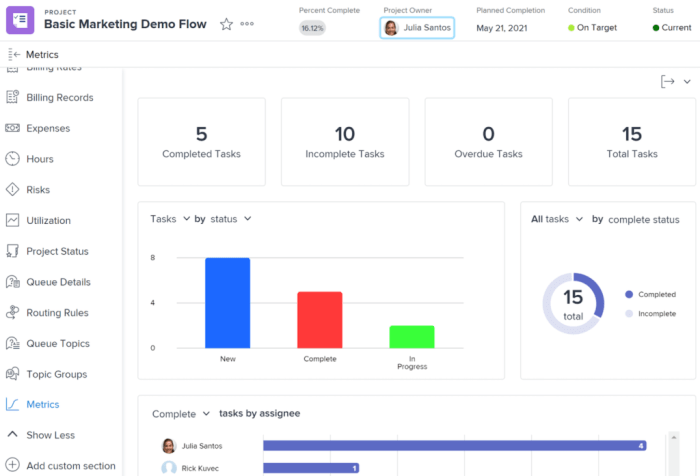In the realm of business operations, the use of Workflow Management Tools That Scale With Your Business is pivotal. This guide aims to delve into the intricacies of these tools, shedding light on their importance and impact on organizational efficiency and growth.
As we navigate through the various aspects of workflow management tools, you'll gain valuable insights into how they can revolutionize the way businesses operate and expand.
Overview of Workflow Management Tools
Workflow management tools are software applications designed to help businesses automate, streamline, and optimize their internal processes. These tools provide a centralized platform for managing tasks, tracking progress, and improving communication among team members.
Benefits of Using Workflow Management Tools
- Increased Efficiency: Workflow management tools help eliminate manual tasks and automate repetitive processes, allowing employees to focus on more strategic tasks.
- Improved Collaboration: These tools enable real-time collaboration among team members, facilitating communication, feedback, and accountability.
- Enhanced Transparency: By providing visibility into the status of tasks and projects, workflow management tools help teams stay organized and on track.
- Better Decision-Making: With access to data and analytics, businesses can make informed decisions to optimize workflows and improve overall performance.
Popular Workflow Management Tools
- Trello: A user-friendly tool that uses boards, lists, and cards to organize and prioritize tasks.
- Asana: Known for its customizable features, Asana helps teams track projects, assign tasks, and set deadlines.
- Jira: Ideal for software development teams, Jira offers advanced project planning, tracking, and reporting capabilities.
- Monday.com: A visual project management tool that allows teams to create workflows, automate processes, and track progress in a visually appealing way.
Factors to Consider When Choosing Workflow Management Tools
When choosing workflow management tools for your business, scalability is a crucial factor to consider. Scalability refers to the ability of a tool to grow and adapt alongside your business as it expands and evolves. Evaluating scalability in relation to business growth involves assessing how well a tool can handle an increasing workload, users, and processes without compromising performance or efficiency.
Scalability Evaluation Criteria
- Flexibility: Look for tools that offer customizable workflows to accommodate changing business needs and processes over time.
- Integration Capabilities: Consider tools that easily integrate with other software and systems used in your organization to ensure seamless workflow management.
- Performance Metrics: Evaluate tools that provide performance monitoring and analytics to track workflow efficiency and identify areas for improvement as your business scales.
- Resource Allocation: Choose tools that allow for easy allocation of resources, such as assigning tasks, managing workloads, and tracking progress, to support scalability.
Comparison of Scalability Features
| Tool | Scalability Features |
|---|---|
| Asana | Offers project templates, task dependencies, and workload management to support scalable project management. |
| Trello | Provides customizable boards, automation features, and integration options for scaling task management across teams. |
| Jira | Includes advanced reporting, agile planning tools, and scalable issue tracking for large-scale project management. |
Successful Business Scaling Examples
- Company X implemented Asana to streamline their project workflows and successfully scaled their operations to handle a 50% increase in projects within a year.
- Startup Y adopted Trello for task management and collaboration, allowing them to scale their team from 10 to 100 employees while maintaining efficiency.
- Enterprise Z integrated Jira for agile project management and saw a 30% improvement in productivity as they scaled their operations globally.
Customization and Integration Capabilities

Customization and integration capabilities play a crucial role in the successful implementation of workflow management tools within a business. Let's explore why they are important and how they can enhance workflow efficiency
Importance of Customization for Aligning Tools with Specific Business Needs
Customization allows businesses to tailor workflow management tools to meet their specific requirements and processes. By customizing the tools, companies can ensure that they align perfectly with their unique workflows, making them more efficient and effective in addressing their business needs.
Role of Integration Capabilities in Enhancing Workflow Efficiency
Integration capabilities enable workflow management tools to seamlessly connect with other software and systems used within the organization. This integration enhances workflow efficiency by automating processes, eliminating manual data entry, and ensuring smooth communication between different tools and departments.
Experiences of Businesses that Customized and Integrated Tools for Better Scalability
Many successful businesses have shared their experiences of customizing and integrating workflow management tools to achieve better scalability. By adapting the tools to their specific requirements and integrating them with existing systems, these companies were able to streamline their workflows, improve collaboration, and increase productivity.
Tips on How to Maximize Customization and Integration for Optimal Performance
- Identify specific workflow requirements and objectives before customizing or integrating any tools.
- Collaborate with IT professionals or vendors to ensure seamless customization and integration processes.
- Regularly assess and update customized workflows to adapt to changing business needs and technological advancements.
- Train employees on how to effectively use customized and integrated tools to maximize their potential benefits.
- Monitor performance metrics to measure the impact of customization and integration on workflow efficiency and make adjustments as needed.
Automation Features for Scalability
Automation features in workflow management tools play a crucial role in enhancing scalability by reducing manual tasks and streamlining processes. This not only saves time but also improves overall efficiency within an organization.
Task Automation
- Automated task assignment: Workflow management tools can automatically assign tasks to the appropriate team members based on predefined rules, reducing the need for manual delegation.
- Automated notifications: These tools can send automated notifications and reminders to team members about upcoming tasks, deadlines, or any changes in the workflow, ensuring timely completion.
- Automated data entry: By integrating with other tools or systems, workflow management tools can automate data entry processes, eliminating the need for manual data input and reducing errors.
Impact on Scalability
- Improved productivity: Automation of repetitive tasks frees up valuable time for employees to focus on more strategic and high-value activities, ultimately boosting productivity.
- Enhanced scalability: With automation handling routine tasks, businesses can easily scale their operations without the need to hire additional resources, leading to cost savings and improved efficiency.
- Reduced errors: Automation reduces the chances of human error, ensuring consistency and accuracy in task execution, which is crucial for maintaining quality standards as the business grows.
Conclusive Thoughts
By exploring the realms of workflow management tools that adapt and grow with your business, we uncover a world of possibilities for enhanced productivity and success. As you embark on your journey to streamline processes and boost efficiency, remember that the right tools can make all the difference in scaling your business to new heights.
Questions and Answers
What are the key benefits of using Workflow Management Tools for businesses?
Workflow Management Tools help businesses streamline processes, increase efficiency, improve communication, and enhance collaboration among team members.
How can businesses evaluate scalability when choosing Workflow Management Tools?
Businesses can evaluate scalability by assessing the tool's ability to handle increased workloads, users, and data as the business grows. They should also consider the flexibility of the tool to adapt to changing business needs.
What role does customization play in aligning Workflow Management Tools with specific business needs?
Customization allows businesses to tailor the tools to their unique requirements, ensuring a better fit for their operations and objectives.
How do automation features in Workflow Management Tools contribute to scalability?
Automation reduces manual tasks, improves efficiency, minimizes errors, and enables businesses to handle increased workloads without compromising quality.









